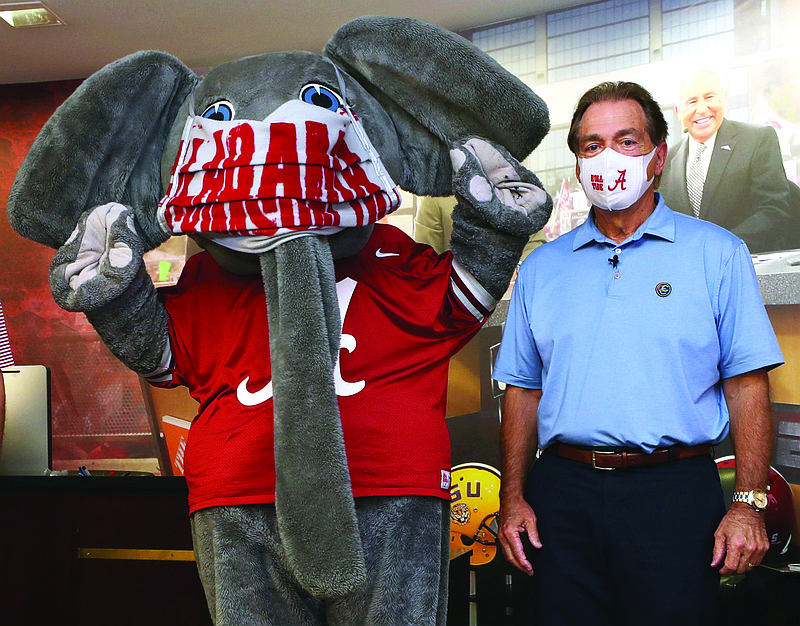There is still time to pull off a college and NFL football season.
The most practical thing you can do to help make sure it happens, if you want it to, is to wear a mask.
Even though I'm sure the Atlanta Falcons will find a creative way to let me down again, I want there to be a season. I want to see how an Eliah Drinkwitz offense looks with Missouri's personnel against Southeastern Conference defenses.
My mask isn't perfect. It's actually a neck gaiter folded over. But I wore it Saturday to Hy-Vee when I did my weekly grocery shopping, and I was encouraged to see most everyone else was too, even if the directional stickers on the floor were treated more like suggestions.
Coronavirus cases have continued to rise across the United States, and the curve was never really flattened. March 23 was the last time we had fewer than 10,000 new cases daily across the country, according to official data from Johns Hopkins University, and since there have only been 13 non-consecutive days in which fewer than 20,000 new daily cases were reported, the last coming June 15, before the U.S. spiked to pre-quarantine levels.
In my view, it's hard to blame the average American for this. First we were told masks had no use, or that only N95 masks worked. It's been exhausting trying to keep up with what works, what doesn't, which outdoor spaces are safe and even who and what to listen to. It's also been strange to hear about the ravages of the virus and disease elsewhere, when Boone and Cole counties combined have collectively recorded four deaths and fewer than 400 cases.
But masks work. The Philadelphia Inquirer published analysis of new cases Wednesday showing, as states started re-opening, those requiring mandatory public mask use (California, Delaware, Illinois, Maine, Maryland, Massachusetts, Michigan, New Mexico, New York, Virginia and Rhode Island) saw a 25 percent decrease in new cases between the first and second weeks of June (from 61,064 new cases June 1-7 to 49,950 new cases June 8-15).
States recommending, but not requiring mask use (Alaska, Arizona, Idaho, Iowa, Kansas, Missouri, Montana, North Carolina, North Dakota, Oklahoma, South Carolina, South Dakota, Texas, Utah, West Virginia and Wisconsin) saw an 84 percent increase in new cases, from 38,636 June 1-7 to 71,165 the following week. States requiring employees of certain businesses to wear masks (Alabama, Colorado, Florida, Georgia, Kentucky, Louisiana, Minnesota, Nevada, Ohio, Oregon and Vermont) saw a 74 percent increase in new cases, from 28,321 to 48,062.
States like Arizona and Texas are reimposing restrictions and pumping the breaks on reopening. The reasoning is clear: a second nationwide quarantine period is untenable, for individuals, families, for personal finances and for businesses large and small.
Missouri's athletic department reported five positive cases from 308 tests in early June. The amount of positive results at other athletic departments - 37 football players at Clemson, 14 football players at Kansas State and 30 athletes at LSU quarantining, among others - is concerning, as more and more cases are popping up in the age 18-24 demographic.
Here, the lack of a unifying ruling body with the power to mandate consistent protocols is endangering the college season. Schools like MU can do things as right as possible in the moment, including identifying positive cases by testing everyone, but if an opponent's bubble isn't as tight in September or October, all that work was for nothing.
And "Oh, college athletes are in the shape of their lives, who cares if they get it?" is an awful strategy, and callous, too. Even without hospitalizations or intubations, there are still long-term risks of lingering side effects. And if testing isn't done weekly or more often, asymptomatic carriers, like four of Missouri's five positive results, don't only come into contact with other fit college athletes.
Absent a more robust public health response from federal, state and local government, wearing a mask is the most beneficial single action you can take to keep yourself, and others, safe.

